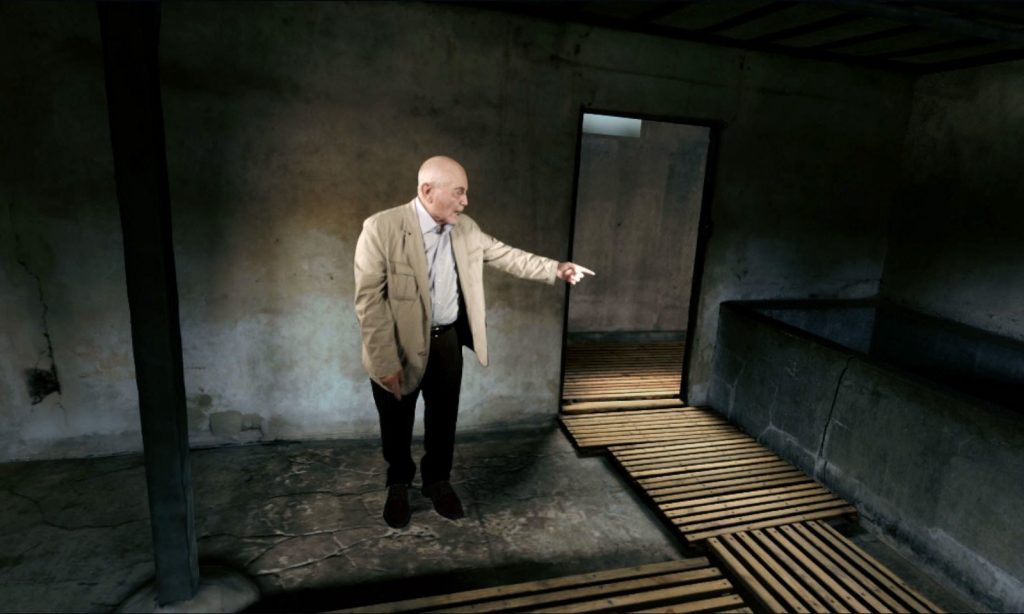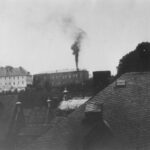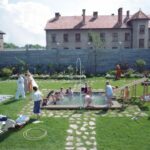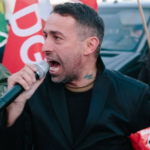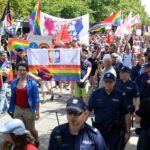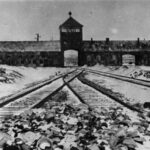Blog Post
How one boy survived the Warsaw Ghetto and six concentration camps
By Jonathon Van Maren
After surviving six Nazi concentration camps and the Warsaw Ghetto, it is a miracle that Pinchas Gutter has lived to become 86 years old. Born in 1932 in Lodz, Poland, just a few years before the Reich that would murder millions of his people sent their servants tromping across the border in a blitzkrieg that was merely a dress rehearsal for things to come. He lost his parents in Majdanek. His twin sister perished, too. Gutter himself barely clung to life. Some days, he still cannot explain how he did—and why he is the only member of his immediate family to survive.
After being liberated by the Red Army in 1945, the orphaned Gutter was sent to Britain. In 1952, four years after the State of Israel rose from the ashes of the Holocaust, he joined the Israeli army, subsequently living in both Brazil and South America before immigrating to Canada in 1985. Like many other survivors, he didn’t talk about his experiences for years. For years, after all, nobody wanted to hear them. That, at least, has changed, and Gutter frequently gives lectures on what he endured, and has also been the centre of two films that focus on his life.
His incredible story has been noticed by men as prestigious as President Barack Obama, who noted during a speech at the USC Shoah Foundation that, “I think of Pinchas Gutter, a man who lived through the Warsaw Ghetto Uprising, and survived the Majdanek death camp…’I tell my story,’ he says, ‘for the purpose of improving humanity, drop by drop by drop. Like a drop of water falls on a stone and erodes it, so, hopefully, by telling my story over and over again, I will achieve the purpose of making the world a better place to live in.’ Those are the words of one survivor—performing that sacred duty of memory—that will echo throughout eternity. Those are good words for all of us to live by.”
Several years ago, I asked a veteran journalist at the Jewish Independent in Vancouver, where I was doing occasional freelance work at the time, what part of his work he valued the most. He didn’t even have to pause. It was the interviews with Holocaust survivors, he said. They had suffered and survived through one of the greatest human tragedies in the history of the world, and he was privileged to hear, first-hand, what they had seen and how they had emerged from the inferno. One by one, they are leaving us, he said, and memory will soon pass into history. To have the opportunity to speak with them is an extraordinary one.
I feel the same way, and it is why the time I have received from people like Pinchas Gutter is very precious to me. I remember, once, sitting in the lounge at Hillel at Simon Fraser University, and watching almost breathlessly as a beautiful, wizened old woman slowly rolled up her sleeve, revealing a faded but still jarring tattoo: Her Auschwitz number. When all those who had numbers preceding her had been murdered, it would be her turn. They never got to her, and so instead she was having coffee with us in an atmosphere so comfortable it seemed surreal, hearing stories that defied imagination.
Some time ago, Pinchas Gutter agreed to speak with me to tell his story. This is what he lived through, in his words.
When did the war start for you?
The war started for me almost the first day, when the Germans attacked Poland. We were in train going back home from a wedding, and the train would stop and would run into a ditch and then the train continue. We were fortunate that we were safe, I can’t remember that anyone was killed. I was a little boy going on 8 and I didn’t exactly appreciate what was going on–I didn’t look if anybody got killed. Anyways, that train was able to get to Lodz.
Things in Poland began to get bad quite quickly and as I understand, anti-Semitism was growing worse in Poland even prior to the war.
Jews came to Poland almost at the same time as Christianity, towards the end of the first millennium. After that what actually happened is that for quite a while there was a pagan worship in Poland, especially in Lithuania, which only became Christian around about 200-300 years later when the Duke of Lithuania married the Queen of Poland. Until about the 18thor 19thcentury, it was complicated. Real anti-Semitism started in 1919 when Poland regained its independence. There was one party in particular, a nationalist party, that wanted to [target] Jews. There were too many Jews, around 10-11 % of the population, [and] they wanted a nationalist Catholic Poland, and they didn’t actually like Ukrainians or Moldavians–they wanted to have a “clean” Poland. There were Jewish members of parliament between 1919 and 1939, there were Jewish senators, members of municipalities, mayors. I mean, it was a mixed bag, it was not just anti-Semitism.
When did Nazi anti-Semitism started after the 1939 invasion, in your memory?
Nazi anti-Semitism was already in place in Germany. In Poland it was a religious, ethnic kind of problem. Whereas in Germany it was different. My first contact with the Germans was within the week or ten days after they arrived. When the Germans attacked Poland, behind the troops came the secret service, the Gestapo, the SS–they came behind. They rounded up notables: they killed priests, rabbis and, anybody they saw [as] a resistance in future to their occupation. These elements might create problems for them, so they started rounding up people. There were lots of Germans living in Poland, ethnic Germans Polish citizens who were left over after Poland regained its independence. For example, in Lodz there were around 100,000 ethnic Germans, so they collaborated with them before the war, and they made up list, and my grandfather who was a president in charge of a seminary, teaching people to become a rabbi–he was one of those persons on the list, which they got from the council.
They came. We shared an apartment with [a door in between] because my grandfather was about 78 years old, so [when] they came to take my grandfather and they rang the bell, nobody was working because the war was going on. We were wine makers; my father was at home, and my grandfather was recuperating from a kidney operation, so he was on the bed. There was ring. My father went to open the door, [and] they asked for my grandfather. He took them to his bedroom. He was lying there, and they saw he is dying anyways, so we won’t bother to take him. They asked my father: Who are you? He said, I am the son. They asked: What do you do?
I am a winemaker, replied my father. Then they asked: Where do you make wine? They took him away and beat him almost to death and threw him in the corner, and they got the German military police to take all the trucks as they were passing by that street going to the front, to come and help themselves to thousands of bottles of wine. Wine which [was] maturing–they broke those, and they destroyed in 48 hours what had been there for 100 years. Then the caretaker went down to see my father, because he saw them taking him, [and] found him unconscious, bleeding. [He] risked his life because there was curfew–that’s how we learnt what happened. So, this was my first encounter with the SS, [the] two SS men who came to collect my grandfather. I was in the bedroom when this was happening.
And then things started to get worse. Jews couldn’t have bank accounts; their bank accounts were frozen. [If you] had a convenience store, or [were] a tailor, or if you were employed by [the] bank or police, all of these people lost their jobs and they were unemployed. You had to give up jewelry. Every day there was a new law. You couldn’t go to a park, you couldn’t use public transport. I mean, it just became impossible to really exist. And, of course, our wine making business was completely destroyed. Things were getting really from bad to worse.
They changed all the names of the street. Before all that my father had a younger sister living in Warsaw, and he felt that it would be better to be in Warsaw. My mother was blonde and blue eyed, she looked like a Scandinavian. She was very beautiful woman and she was quite tall, close to 5’11. We were twins–my mother only had two children. I had a sister, we dressed and went to the train station as Christians, and my father who couldn’t pass a Christian because he was dark and had a beard. He actually started walking and it took him two and a half months by smuggling, walking during the night or during the day, either friendly farmers use to hide him in the barn or he used to cover himself with leaves in the forest. It took him two and a half months to reach Warsaw.
And after that the Warsaw Ghetto was opened?
Warsaw Ghetto was only created at the end. It started moving in October, but they closed the wall, I guess, if I remember correctly, on the 1stof November. So, the whole of 1940, there wasn’t a ghetto–people lived all over, but things were just as bad in Warsaw. I give you an example of what happened: there were rations and people were standing in line waiting outside shops, when a Jew came to a line. Then the Polish Christians or the Germans that were there would kick him out or put him at the end, and [when] we got to the shop then there was very little left, or nothing left. And sometimes they would beat you up and just kick you out.
My mother had an idea. By that time there were around 16 or 17 people living in my aunt’s little flat, because other family from my father’s elder sister and their children, all came and stayed with us. My mother had a good idea; she gave me the money, and this little blue-eyed blonde guy who looked reasonably tall for his age would come and stand there and they would push the young guy in the front, and I would get in the shop, and I became the supplier of the food because I would go as a Christian person. And people didn’t know that whether I was German or Polish because I was blonde [and] blue-eyed, and the ideology of the Aryan is that you have to be blue eyed.
So this was how life was. I was never scared–I was always in the street, my sister was in the home with my mother, and I would see scenes like soldiers on leave, who use to have bayonets on their belt, they would take out their bayonet and collect some Jews and would try to scrape their beards with their bayonets, and take skin off. And then they would get girls around and make these elderly religious men dance like monkeys. People who would stop you, I mean any person who was not Jew could stop you and beat you, take everything out of your pocket, rob you, and you could not go to police and say that look I have been robbed. And I am talking about the beginning.
So how did the things go in the intervening period for your family?
Well, my father when he came, he found a little apartment. Unfortunately, he found [it] in a building where the front of the building had been destroyed during the bombardment of Warsaw in 1939. Polish buildings are quadrangles, with the courtyard in the middle. The front of the building was destroyed and rest was still there. So he found a little apartment with one little bedroom and one kitchen with a bathroom and hallways. He started–all he could do-[to] make wines, buying raisins from the black market. He could make wine from any fruit. He set up in the kitchen. I went running around Warsaw–that was before the ghetto closed–looking for empty bottles, which he would wash and he would make this wine in the kitchen and then people would order [it] because Jews would order for Friday night, you know, the tradition that you bless the wine and you bless the bread. And so people would order, people still had money. I would go around and deliver, he would deliver, and this is how we started making a living, and my mother found in the same street a kind of little window kiosk where she stood and was selling little cigarettes and sweets, and for about the time before the ghetto was closed and then after that she found it difficult to find something as everything was on black market.
I will give you an idea: our ration was just under 200 calories, something like 198 calories a day. You know what 198 calories a day is? I think even a Mars Bar is more than that. Everything became a black market and people started to [get] hungry. They squeezed in 350,000 people, which lived in whole area of Warsaw, into about less than 4% of the actual area in the centre of town and they closed the walls. They setup a whole kind of Jewish government. We had a Jewish community council, we had Jewish police, Jewish prisons, Jewish prison officials. We had [a] fire brigade, [a] sanitary system built up by the Germans–except they could do nothing.
Every day [the] SS would come and call the chairman of the Jewish community council and ask what he wants and what he doesn’t want, [and] so started setting up factories from Germany both outside the Ghetto and inside it. They also asked for slave laborers, people who were taken out, thousands of men were taken out, working on roads–people who would never work like this, like lawyers, accountants, metal workers. They became like horses because they had to work on [the] road. They used human beings to pull rollers, and they would bring them back half-dead. They would not feed them properly. Things started getting really bad. We were forbidden to pray, we were forbidden to go to school, and things were–from the beginning of 1941–you started seeing dead people on the streets and as ‘41 went on, more and more people were pushed in the ghettos from surrounding towns. They did ethnic cleansing of all the towns that had Jews, brought Jews from Germany and from other places, and by the end of 1941, there were close to half a million people there.
Nobody knew the exact numbers, but they [say] anything [between] 400 and 800 thousand. And people were pushed, like in my very small apartment. My father used to bring people to sleep at night because they had no place to be. They opened up the halls, the synagogue, and people started dying by the hundreds daily. The Jewish burial society couldn’t cope with that, so they used to catch people in the streets and give them wheel barrows to take dead bodies from the street to a huge and enormous grave ditch. They were throwing them in like you throw garbage. If you had money, you could get a proper funeral with prayers, but if you had no money, you couldn’t. So things went from bad to worse. It was apocalyptic. There were lot of people who had both worked for Germans, Gestapo, who knew how to organize themselves, who were part of the black market, part of the administration, part of the Jewish police, part of all kinds of things. In the Ghetto you actually saw cafes where people were dancing and [drinking] wine and [eating] ducks, and [the] smell would come outside [where] people were dying of hunger. Typhoid started, TB started, and if you go to Jewish cemetery now, which was destroyed, there is a huge grave where 100,000 people were buried, who actually died in the Warsaw Ghetto.
What were your most vivid memories from that time?
The most vivid memory was the way my father and mother tried to protect us. I mean, I always think of my father as an angel with wings and he kind of tried to take his wings and put those wings around us to shield us from all these inequalities. This is basically, when I think about my time, you cannot even think, even if you were there. All this unraveled in July of 1942, when they said all these sick and unemployed people, hungry people—we are going sent you to a place with family, where we will give you 3 kilos of bread and jam for the journey, but you must come voluntarily. Trains and cattle trucks were there. And in the beginning, many people went voluntarily, but in a few weeks, we knew in the Warsaw Ghetto that by going, you were to be deported and travelling where there were gas chambers.
My father, because of the experience he had with Nazis, didn’t trust them at all. They played games, they issued documents, red document, green document, metal tag. They said that these people [were] not going to be resettled, then they would surround the street and tell everyone to come and show their documents and say that these documents are not valid anymore, we issued green documents and only those are not going to be resettled and everyone is going to be resettled. That’s it. We were always hidden, hidden behind walls behind cupboards. We managed to actually stay in the Warsaw Ghetto until the uprising on the 19thof April 1943. By that time, a lot of bunkers were built. Remember, I told you that the buildings were built and were destroyed and were in ruins and under those ruins, they built a bunker right underneath us and put in electricity, water, air vents through the ruins so that they aren’t seen from the street. They had two entrances, with the way you went in, kinds of steps down, and on the 19thof April when they [tried] to fetch people. The uprising started and we went down into the cellar, we were in the bunker, we were there for three weeks and we were discovered.
We went out, we were sent, instead of sending [us to] Treblinka–if I was sent to Treblinka, I wouldn’t be talking to you–I was sent to Majdanek. There men were separated from women, just like they did in Auschwitz. There were selections–I didn’t know then, but my father told me that I must say that I am five years older than the document I got, which I got after the war, because once they chose you as slave labor, you got documents, and it showed that I was born in 1927 instead of 1932, and that way I was standing with my father, as men, and not with children and women. My sister was separated [from us] and she ran towards my mother. When she saw her and hugged her [and] took her around, I suppose she was terrified, my mother hugged her and kept her. They were pushed towards [the] women with children. And since that time, I cannot remember anything about my sister, except that she had a long blonde braid.
Whenever I think of my sister Sabina, the first time I told this story, I broke down. Can you imagine somebody who has got a photographic visual memory and remembers everything from the age of almost two, [and] I can’t remember anything of my sister? She was born and part of me, and I can’t remember anything. Not from before the war, not during the war; except the place, Sabina, when I think of her now, all I see is a beautiful blonde braid. This was when I arrived in Majdanek and then they pushed us into a barrack to undress. We were naked. I said my prayers, because I thought we were going to be killed. I knew that’s what happened. We were running naked with our hands in the air, my father was running in front of me, and there was a man with white coat and he was pushing people right, left. I came into a room with shower heads, and I waited for the gas to come out, because that’s what we knew at the Warsaw Ghetto, that they kind of try to fool you by telling you that you are going to be disinfected but in the meantime, gas comes out and you die. But there water came out, and I was chosen to be a slave laborer.
That’s where you lost your parents?
Yes, my sister and parents were killed the same day. I was looking for my father when I came out of that place, [and] the gas chamber was very near to the showers, and although it changed a bit because some of it was destroyed, if you go to Majdanek today you can actually see: On the one hand showers where people were selected to work, and on the other hand the gas chambers where people were murdered. I looked for my shower and for my father. I saw a man I knew from Warsaw, he used to come and sleep in our tiny kitchen, [and] I asked him where my father was. He didn’t answer, he just lifted his eyes to heaven and in such a way–that might this boy of eleven understand that his father was killed.
You were only a boy of 11 and lost your whole family. How did you manage to cope with things and survive in the way you did?
I don’t know, I ascribe most [it] to two things. Firstly, I was a religious Jew and I believed that Providence kept me. Because if I had to tell you everything that happened from May of 1943 to 1945, it would take me at least another hour, all the different camps I went through. I was selected to work in a–somebody wrote a book about it, he called it factories of death because people worked to death instead [of being] murdered immediately. I was in Buchenwald, loading huge steel goods onto wagons, I was in Theresienstadt; eventually I was liberated by the Russians on the 8thof May. But what kept me, I would say, [is] Providence and chance. It is impossible to believe that you can survive the things I went through. I was selected couple of times to be murdered, but I managed to hide because of the help of a Jewish police man, twice. Once one Jewish police man, the other time another Jewish police man saved my life by taking my rags off and dressing me properly when [during] the last selection when they were liquidating the camp.
Food was scare, you got very little rations, you worked 12 hours a day, [and] I had typhoid. I was then in a labor camp where I worked in an iron field, and that camp was a better camp, because it had a Jewish administration. Depending how good or bad Jewish administrators were, things were either better or worse. And at the end of 1944, they tried to kill the slave workers because they couldn’t replace them because all the Germans were being taken into the army. They already took 60-year-old men into the army, so they needed slave labor. We worked for a company that was owned by the German banks that exists today, it was an armament factory started before the war. Thank God I survived.
You were a survivor of five different camps?
When we had a roll call, the commander, who was an ordinary staff sergeant, an elderly one 50 or 60 years old, he said: Young people step out. Now young people never stepped out because they weren’t regarded as workers and they were murdered, but I stepped out–don’t ask me why–but I stepped out and he took me by the hand, took me to the kitchen, where the SS kitchen was, where they prepared food for the SS and the camp, and when you are working in the kitchen then you can eat. That built my strength so on the death march I managed to walk all this way. Fifteen hundred of us started and half of us, around 700, arrived at Theresienstadt around three weeks before the end of the war.
The thing you have often talked about is the cruelty, where the people who ran the camp attempted to dehumanize those in the camp, but somehow also became less than human themselves in many cases and ended up doing all sorts of horrifying things.
Absolutely. I will tell you about my welcome at Majdanek. The first night we were assigned a barrack and then we were given little bit of something to eat, and then soon lights were off and we had to go to sleep, and I was assigned a bunk at the bottom. I woke up in the morning, [and] I saw three young men hanging from the rafters and of course I was a little Hasidic boy and I knew nothing. I didn’t know what was going on, and I saw people committed suicide, but later on I was told, I wasn’t told the whole story.
They were murdered by the German criminals who were serving their time, they were brought from Germany to become in charge of a barrack. He had two helpers, they were kind of the overlords of the barrack and he was a sadistic man. I was told that he killed people at night, but the fact was that this was my kind of welcome. Then I was beaten by a couple so badly in Majdanek, and how I survived I have no idea. I was lying on a kind of little…anyways he came and asked me what I was doing and I said that I was told by the [commandant] to look after the cleanliness of the barrack, and I was just lying because you know I was busy with flowers and stuff like this, he started kicking me on my back side and he kicked me for about ten minutes and then he just walked away and I was bleeding, and then the bleeding stopped. After the war I had three operations because they found that I was badly injured, and to this day I actually suffer from it. Not badly, but I suffer.
It is hard for those of us who have never experienced these things to even imagine what you went through.
People always talk about Auschwitz–it was no doubt an execution camp–but Majdanek was also a working camp. Five fields, five kinds of separate fields and lots of the prisoners there were not Jews. They were prisoners of wars, Polish resistors, Polish people that were sentenced, and there was camps next to each other, one female camp. The majority of [the] guards were Ukrainians. According to what I saw and according to the suffering, Majdanek was one of the worst camps. For example, people who were gassed were killed, but people who were working were tortured on a daily basis. Instead of using road machineries they used human beings to use those rollers and make roads and make bridges and cement things, really very hard labor. And when they didn’t have anything to do–and I was once involved–they took us to a place where there was a huge mound of stones. We had to run about a kilometre to put these stones somewhere else. We are running with stones and while you are running, they are hitting you with rifle butts and whips, and what’s more, Ukrainian guards loved to kill people, but they didn’t kill them by shooting them only. They would split their heads with spades, if they didn’t like how you worked or if they didn’t like you. They would just take a spade and hit you, and every day when people came back from going to work, they would bring back half a dozen people that were killed while they were working.
You cannot imagine the cruelty and the torture that went on in Majdanek. In Auschwitz they never had such torture, they had a different kind of torture, a different kind of thing, but the Ukrainian guards who were the majority guards in Majdanek–they were so horrific that you cannot imagine. People are scared of going there because it gives you the [memories]. In certain camps you had “good” people who ran the camp, I am talking now about working camp. In Buchenwald, by the time I arrived the communist and left-wing German prisoners managed to take over the internal administration of prison, these were the German prisoners. I suppose it was already end of ’44, beginning of ’45. They kind of saw where it was going, so the left-wing Communists managed to take over the running administration and when they ran the administration, Buchenwald was terrible as there was no food. People were dying from hunger by the hundreds. You went to sleep with a thousand people and you wake up in the morning and you took forty to fifty bodies out to be counted and then taken to the crematorium.
Buchenwald didn’t have a gas chamber, but it had a crematorium to cremate remains of the people who died. All these things were going on all the time and it just impossible to believe. The only reason I survived that camp was because a Jewish police man who had a wife–Jewish administration had special privileges, so the Jewish commander of the women, she had a husband, her children, her mother and they had separate barrack, had plenty to eat and they were regarded as collaborated–but this Jewish police man had a wife who was dying with TB, and he also happened to come from Lodz and he knew my family. He told me that I must become a nurse. I worked for twelve hours, [and] when I came back I use to look after her, I would wash her, clean her. She was dying with TB. [I would] wash her clothes, wash everything that she was using like pillow cases, sheets and whatever. And he would give me extra food, and he saved my life at the end because I was sentenced to be murdered by the commander.
Then in the other camp for example, the commander of the camp was a wonderful man–he managed to keep the Germans and Ukrainians out of the camp and they never came inside. The camp was run by the Jewish police. Nobody died there–well that’s not true, one person died–but he died for his own faults because we were very near the lines of the trains that were going to Russia, with tanks and things and they were very heavily guarded by all kinds of people on the outside. We were very near to a main railway line to Russia. So, one person went too near to the wire [and] one of the guards from outside shot him, but apart from that nobody died in that camp and the food was much better, and winter came he got some tailors in the camp to cut some blankets and give them to prisoners because in winters Poland gets very cold, colder than Canada often. I remember, at one stage when my shoes were worn out, I had to put paper from cement rooms [in them].


